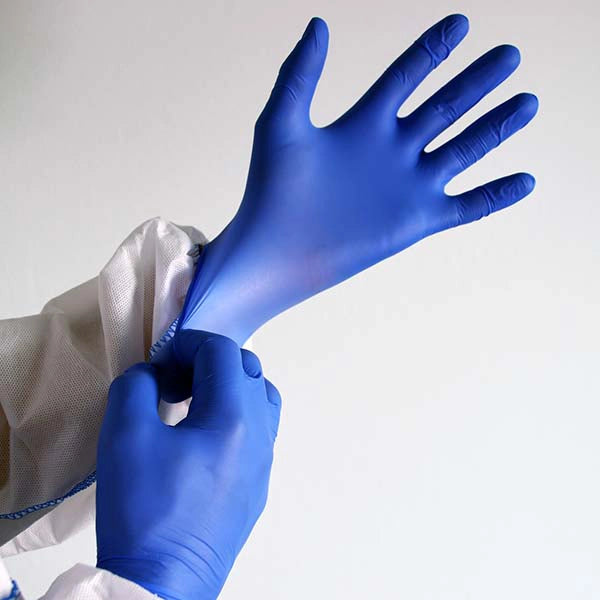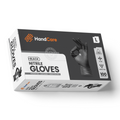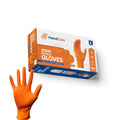Nitrile gloves are an excellent choice for disposable gloves for a variety of situations, but if you’re handling anything harsher than, say, a bottle of Windex, it’s always an excellent idea to make sure your gloves are actually up to the job.
We’ve got you covered, with this handy guide to what sort of exposure nitrile gloves can take — and what they can’t.
In this article, we’ll start by taking a look at how you should judge nitrile gloves for chemical protection and give you a brief overview of the most commonly encountered chemicals nitrile gloves can and can’t protect against.
We’ll also answer some frequently asked questions about nitrile gloves interaction with chemicals. At the end of the article, you should have a pretty good handle on what your nitrile gloves can, well, handle.
If you need information quick, feel free to scroll down to our resistance chart below — and if you’re in the clear, we’ve got a great selection of some of the best nitrile gloves on the market.
At a glance:
Nitrile Gloves Chemical Resistance Chart
If you just want to know whether or not a certain disposable glove can get the job done with the chemicals you’ll be working with, we’ve got you covered with a quick guide.
Use this disposable gloves chemical resistance chart to see at a glance which gloves are best suited for handling a variety of substances.
Are Nitrile Gloves Chemical Resistant?
Nitrile is a synthetic rubber with excellent flexibility, puncture resistance, strength and abrasion resistance. They also offer good resistance to many chemicals, making them well-suited for a variety of tasks.
That doesn’t mean they’re always safe, though. In some cases, you can get by with using nitrile gloves for a short duration before they stop being effective, but in others you’ll want to avoid using them at all in order to keep yourself safe.
Before you get started, it’s important to take a good look at the chemical relationship between the nitrile butadiene rubber that makes up the gloves and the material you’re working with.
Glove Compatibility Chart
This chart provides a quick reference to help choose the right glove for specific tasks based on compatibility and performance factors.
| Glove Type | Material | Chemical Resistance | Durability | Elasticity/Fit |
Common Uses
|
|
Nitrile |
Synthetic Rubber |
Excellent | High | High | Medical, Industrial
|
| Vinyl Gloves |
Polyvinyl Chloride (PVC) | Moderate | Low to Moderate | Low to Moderate | Food, Cleaning
|
| Latex Gloves |
Natural Rubber |
Good | Moderate to High | High | Medical exams, surgery
|
| Neoprene Gloves |
Synthetic Rubber |
Good | High | Moderate | Chemical handling, industrial |
| Butyl Gloves |
Butyl Rubber |
Excellent | High | Low to Moderate | Handling corrosive chemicals, industrial |
Nitrile Gloves Chemical Resistance Evaluation Criteria
When gloves are exposed to chemicals, they are judged on three criteria.
Breakthrough Time
When the exterior of the glove is exposed to a chemical, this is the amount of time it takes the substance to be felt on the inside of the glove.
A glove that lasts more than eight hours has what’s considered an outstanding breakthrough time, though that same glove could have a shorter breakthrough time when exposed to a different chemical.
Once breakthrough occurs, a glove can no longer be considered safe and should be discarded.
Degradation
When a glove comes into contact with a solvent, it can undergo physical alterations such as swelling, splitting, softening, or shrinking. These changes represent the breakdown of the glove material.
Nitrile gloves can degrade faster or more slowly depending on the chemical they’re exposed to. Nitrile gloves can last for hours when working with certain substances or begin to swell or crack within minutes when exposed to others.
Permeation Rate
This refers to the pace at which a chemical passes through the glove on a molecular level. Since there’s more material to move through, a thicker glove will take longer to move through than a thinner one, which generally means thicker gloves tend to have a lower permeation rate.
This rate can often increase with materials that are in motion. Given that hands and fingers are often in motion, that means for nitrile gloves a moderate permeation rate should be approached with caution.
What Chemicals Are Nitrile Gloves Resistant To?
A good quality pair of nitrile gloves can be helpful when handling a variety of chemicals.
Nitrile has good resistance to:
- fuels
- petroleum products
- vegetable oils
- greases
- some organic solvents
- weak acids
- weak caustics
- household detergents
Of course, it’s important to always remove and discard gloves safely after contamination with any hazardous substance.
What Chemicals Do Nitrile Gloves Have Poor Resistance To?
While they can keep the hands safe in many cases, nitrile gloves provide limited chemical protection against many others.
Nitrile has poor resistance to:
- ketones
- alcohols
- halogenated hydrocarbons
- aromatic hydrocarbons
- esters
- ethers
- amines
- strong acids
Conclusion
At the end of the day, the most protective gloves are ones that are chemically able to withstand whatever you’re working with for long enough to get the job done.
As you’ve seen in this article, that can vary widely when it comes to nitrile gloves and the world of chemicals they can be used to handle. The chemical resistance chart above is a handy quick reference to keep close by in order to help you select the best type of protection for your needs.
👉 Shop the best gloves for chemical resistant and save up to 50% today
If you’ve checked the charts and decided that nitrile disposable gloves are the ones for the job, check out our selection of chemical resistant gloves today. With several decades in the disposable glove business, you can trust our team to provide the highest quality nitrile gloves at great prices.
Nitrile Gloves Chemical Resistance: Frequently Asked Questions
Are Nitrile Gloves Acid Resistant?
Nitrile gloves’ acid resistance can depend on what acid we’re talking about.
Generally speaking, nitrile gloves are resistant to many weak acids, including some nitric acids, phosphoric acids and hydrochloric acids. They should not be used with more concentrated, stronger, or highly corrosive acids, like 95% sulfuric acid, though, as they don’t provide adequate protection.
As with all chemical reactions, the specific chemicals involved and amount of exposure should always be taken into consideration when choosing proper hand protection.
Will Acetone Dissolve Nitrile Gloves?
It’s not a good idea to use nitrile gloves to handle acetone. Exposure to acetone will indeed cause nitrile gloves to deteriorate. If the gloves are on the thinner side, breakthrough to the skin can occur in less than a minute.
If you have to handle acetone, it’s best to choose a different glove material like latex.
How to Properly Remove Contaminated Gloves?
No matter what type of gloves you are using, it is important to know how to take them off correctly. Failure to do so can mean exposure of bare skin to the exact chemicals the gloves were protecting you from in the first place.
Basically, you should:
- Grab one glove near, but not at the wrist.
- Peel it all the way off and hold onto it.
- Reach under the cuff of the remaining glove with your fingers.
- Peel off the second glove by turning it inside out, being careful not to touch the outside surface of the glove.
- Dispose of the gloves safely and wash your hands for at least 20 seconds.
How Do You Select Glove Size for Optimal Performance?
When choosing gloves based on size, the most important thing to keep in mind is how the gloves will be used. The appropriate glove should enable you to complete your tasks with practical ease.
If you are working with chemicals on a daily basis, it is important to choose a glove that does not compromise your ability to perform these tasks in an efficient manner.
A glove that is too small for your hand will be overstretched and less protective. A glove that is too big will reduce flexibility and get destroyed easily. To find the right sizing, consult the manufacturer's size table.
What about thickness?
Choosing gloves based on thickness can be a bit of an art and science, but it ultimately boils down to what your needs are.
Thicker disposable nitrile gloves can provide more protection than a thinner glove of the same material, due to the longer amount of time it can take for a chemical to make it through the nitrile material.
Glove thickness of standard nitrile gloves is otherwise somewhat a matter of preference. A thicker gauge glove is more resistant to punctures from sharp objects, but they can be somewhat bulky and stiff. While thinner gloves offer less protection, they are more dexterous and comfortable.







